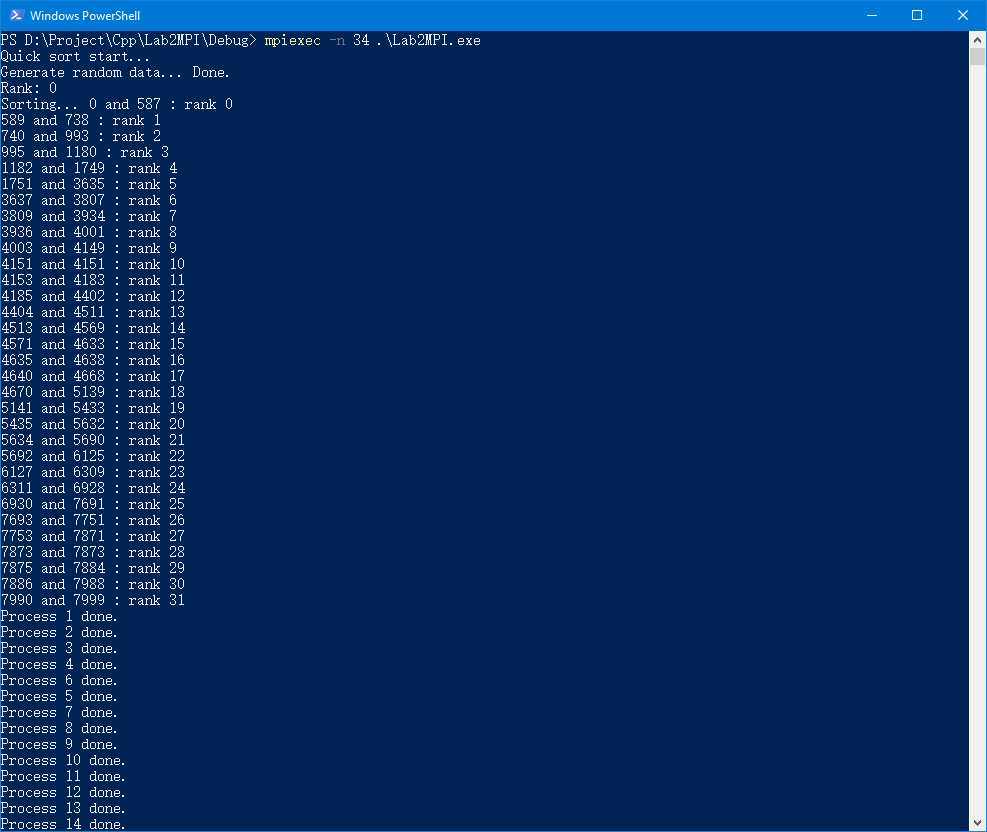基于 MPI 的快速排序算法的实现
Posted justsong
tags:
篇首语:本文由小常识网(cha138.com)小编为大家整理,主要介绍了基于 MPI 的快速排序算法的实现相关的知识,希望对你有一定的参考价值。
完整代码:
#include <iostream>
#include <cstdlib>
#include <ctime>
#include <algorithm>
#include <cmath>
#include <mpi.h>
using namespace std;
struct Pair {
int left;
int right;
};
const int MAX_PROCESS = 128;
const int NUM = 8000;
const int MAX = 1000000;
const int MIN = 0;
int arr[NUM];
int temp[NUM];
Pair pairs[MAX_PROCESS];
int counter = -1;
void swap(int A[], int i, int j) {
int temp = A[i];
A[i] = A[j];
A[j] = temp;
}
int findpivot(int i, int j) {
return (i + j) / 2;
}
int partition(int A[], int l, int r, int pivot) {
do {
while (A[++l] < pivot);
while ((r != 0 && (A[--r] > pivot)));
swap(A, l, r);
} while (l < r);
swap(A, l, r);
return l;
}
void quicksort(int A[], int i, int j, int currentdepth, int targetdepth) {
if (currentdepth == targetdepth) {
int rank = ++counter;
pairs[rank].left = i;
pairs[rank].right = j;
cout << pairs[rank].left << " and " << pairs[rank].right << " : rank " << rank << endl;
return;
}
if (j <= i) return;
int pivotindex = findpivot(i, j);
swap(A, pivotindex, j);
int k = partition(A, i - 1, j, A[j]);
swap(A, k, j);
quicksort(A, i, k - 1, currentdepth + 1, targetdepth);
quicksort(A, k + 1, j, currentdepth + 1, targetdepth);
}
void quicksort(int A[], int i, int j) {
if (j <= i) return;
int pivotindex = findpivot(i, j);
swap(A, pivotindex, j);
int k = partition(A, i - 1, j, A[j]);
swap(A, k, j);
quicksort(A, i, k - 1);
quicksort(A, k + 1, j);
}
int main(int argc, char* argv[]) {
MPI_Init(&argc, &argv);
int RANK, SIZE, targetdepth, left, right, REAL_SIZE;
MPI_Comm_rank(MPI_COMM_WORLD, &RANK);
MPI_Comm_size(MPI_COMM_WORLD, &SIZE);
REAL_SIZE = SIZE;
if (RANK == 0) {
cout << "Quick sort start..." << endl;
cout << "Generate random data... ";
memset(arr, 0, NUM * sizeof(arr[0]));
srand(time(NULL));
for (int i = 0; i < NUM; i++) {
arr[i] = MIN + rand() % (MAX - MIN);
}
cout << "Done." << endl;
targetdepth = log2(SIZE);
cout << "Rank: " << RANK << endl;
cout << "Sorting... ";
quicksort(arr, 0, NUM - 1, 0, targetdepth);
REAL_SIZE = counter + 1;
for (int i = 1; i < SIZE; i++) {
int left = pairs[i].left;
int right = pairs[i].right;
MPI_Send(&REAL_SIZE, 1, MPI_INT, i, 99, MPI_COMM_WORLD);
MPI_Send(&left, 1, MPI_INT, i, 0, MPI_COMM_WORLD);
MPI_Send(&right, 1, MPI_INT, i, 1, MPI_COMM_WORLD);
MPI_Send(&arr, NUM, MPI_INT, i, 2, MPI_COMM_WORLD);
}
left = pairs[0].left;
right = pairs[0].right;
quicksort(arr, left, right);
cout << "Process " << RANK <<" done."<< endl;
}
for (int process = 1; process < REAL_SIZE; process++) {
if (RANK == process) {
MPI_Status status;
MPI_Recv(&REAL_SIZE, 1, MPI_INT, 0, 99, MPI_COMM_WORLD, &status);
MPI_Recv(&left, 1, MPI_INT, 0, 0, MPI_COMM_WORLD, &status);
MPI_Recv(&right, 1, MPI_INT, 0, 1, MPI_COMM_WORLD, &status);
MPI_Recv(&arr, NUM, MPI_INT, 0, 2, MPI_COMM_WORLD, &status);
if (process < REAL_SIZE) {
quicksort(arr, left, right);
MPI_Send(&arr, NUM, MPI_INT, 0, 0, MPI_COMM_WORLD);
cout << "Process " << RANK << " done." << endl;
}
}
}
if (RANK == 0) {
for (int i = 1; i < REAL_SIZE; i++) {
//cout << "Master is ready to receive data from process " << i << endl;
MPI_Status status;
MPI_Recv(&temp, NUM, MPI_INT, i, 0, MPI_COMM_WORLD, &status);
for (int j = pairs[i].left; j <= pairs[i].right; j++) {
arr[j] = temp[j];
}
//cout << "Master has combined data from process " << i << endl;
}
cout << "Done." << endl;
cout << "Result:" << endl;
int counter = 1;
int row = 20;
for (int i = 0; i < NUM; i++, counter++) {
cout << arr[i] << " ";
if (arr[i] < arr[max(i - 1, 0)]) {
cerr << "Invalid! " << arr[i] << " > "<< arr[max(i - 1, 0)] <<" i is "<< i << endl;
}
if (counter % row == 0) cout << endl;
}
}
MPI_Finalize();
}运行截图:

以上是关于基于 MPI 的快速排序算法的实现的主要内容,如果未能解决你的问题,请参考以下文章